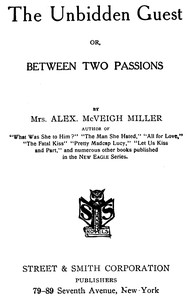The Unbidden Guest or Between Two Passions by Mrs. Alex. McVeigh Miller
FIRST CHAPTERROMANCE
7/23/20255 min read


Originally published: May 1919
Genres: Romance
Dime Novel Bibliography: https://dimenovels.org/Item/1064/Show
Goodreads link: https://www.goodreads.com/book/show/235165271-the-unbidden-guest
Gutenberg link: https://gutenberg.org/ebooks/76151
Chapters: 44
CHAPTER I
THE GYPSY’S CURSE
“Heigh-ho! I wish I were a boy, then I would run away from The Crags and see the beautiful world that lies hidden beyond these tall mountains!”
It was the voice of a pretty young girl, poised on tiptoe on the very verge of a lofty cliff, gazing down eagerly at the scene far below, the silvery Greenbrier River, the gleaming line of serpentine railway, and the winding road that curved around the jagged cliffs up to the heights where stood The Crags, a picturesque old stone mansion.
Here several generations of the aristocratic Willoughbys had lived and died, and the present owner and incumbent was Miss Cyrilla Willoughby, a spinster of sixty years, with literary tastes, who spent her time preparing for publication the memoirs of her distinguished race.
And the girl?
Oh, a mere nobody! A sort of protégée of Miss Willoughby.
It was quite seventeen years ago that the lady’s cousin, a stern, domineering soldier, had stalked into her library one day, saying abruptly:
“Cyrilla, there are some impudent, thieving gypsies camped in your south meadow, and I have taken the liberty of driving them off. I gave orders for them to be gone bag and baggage before dark.”
“But was that necessary, Eustis? They have camped on my lands several times before, and never did any harm that I know of, and they amused the young people of the neighborhood telling their fortunes,” remonstrated the spinster mildly.
“They know no more of the future than you or I, Cyrilla!” he returned sharply, without taking the trouble to tell her that the enraged gypsy queen had told his fortune gratis in a string of maledictions, prophesying unnumbered evils on his luckless head.
He had cursed her in return for an impudent jade, and strode from the camp with a brow as black as night, shuddering, in spite of himself at her invocations of the Evil One’s power, though he was not superstitious enough to place any confidence in the efficacy of her prayers.
Be that as it may, the Fates were weaving a grim web about Colonel Ritchie’s future, and before midnight he was summoned to his city home by a telegram announcing the death of a near and dear relative.
Though he had only arrived that day with his wife and little daughter, Lelia, for a month’s visit at The Crags, they left by the first train for their city home, and he never returned, for his death occurred two years later in the Indian Territory, while gallantly leading a charge against a hostile tribe. Thus he never knew that the banished gypsies had forgotten or deserted a lovely, dark-eyed babe in their flight. It was found in the woods next morning by the servants of Miss Willoughby, and carried to The Crags.
And for beauty and brightness, every one vowed that the half-naked little waif had never had an equal. Just a few months old, it smiled into their faces, cooing and gurgling so engagingly that it won every heart by its infantile pleading of its own cause.
“It must be sent to the poorhouse!” announced Miss Willoughby unconcernedly. What was a pretty gypsy brat to her, a Willoughby!
But Jane Dobbs, the new housekeeper, clasped it to her heart, begging to keep it for her own.
“It’s just the age of the one I lost, and it’ll be sech a comfort to me, please ’m!” she sobbed humbly.
“Keep it, then, so that it does not interfere with your work, or bother me,” returned the spinster carelessly, and thus the little gypsy came to belong to The Crags.
Gypsy—that was what they always called her, every one at The Crags, and it was no matter that Jane Dobbs bestowed on her protégée a string of high-sounding names, they were all ignored, and she soon came to know and answer to the first one.
For her surname little Lelia Ritchie, when she visited The Crags soon after the colonel’s death, became responsible.
“Go away, you little dark gypsy! Laurie and I don’t want to play with you!” she cried, driving her away with a sharp little slap that sent Gypsy, sobbing, to hide her tingling cheek in the housekeeper’s skirts.
The servants adopted the epithet, turning it into Gypsy Darke, and thus it remained ever after.
Lelia was five years old then, and the despised waif just about three. Laurie was eight, the only and motherless child of Miss Willoughby’s eldest brother, the general. He was a handsome, brown-eyed boy, the constant playmate of the radiant, blond Lelia, for their homes were under one roof, Mrs. Ritchie having gone to live with her widowed brother, when the colonel met his death on the field of battle.
Miss Willoughby’s haughty little niece and nephew never deigned to make a playmate of the pretty little waif whose dark eyes, full of wistful love and longing, followed them about their childish sports. If she came too near them Lelia always drove her angrily away, exclaiming spitefully:
“Papa always hated Indians and gypsies, and so do I. You need not offer us your ugly toys and wild flowers. We don’t want them, and we hate you!”
Laurie Willoughby never disputed Lelia’s authority, never took Gypsy’s part, but neither did he join in his cousin’s active hostility. He was a quiet, undemonstrative boy, and he knew that if he went contrary to Lelia’s will she would slap his face as readily as she did the little waif’s, with her big, wistful, dark eyes, like a frightened fawn’s under her cloud of silky, black ringlets.
He was a little gentleman, he knew it was not manly to fight with girls, least of all his vixenish cousin, whom he had been told by his aunt was going to be his little wife when they got old enough to marry.
It was a pet project of the family to unite the pair’s fortunes indeed, so they did all in their power to foster their childish love.
So all three were grown up now. Laurie, Lelia, and Gypsy, and as the latter stood on the verge of the cliff in the golden glow of the June morning, gazing far down the dizzy height at the express-train flashing along over the steel rails, and heard the shrill whistle announcing its arrival at the station, she knew that Miss Willoughby’s expected visitors, the devoted cousins, had arrived, and would soon be at The Crags.
Nothing else had been talked of for weeks but this visit, the first in five long years, for Laurie and Lelia had both been abroad several years finishing their educations—he at a German university, she at a Parisian boarding-school.
How fine and grand they would be, and what great doings would go on at The Crags, quite upsetting Miss Willoughby’s literary labors; for a large house-party had been invited to meet the cousins, and by tomorrow all would be arrived, and the staid old mansion turned topsy-turvy with fun and frolic, and dancing and coquetry.
The girl on the cliff, young, beautiful, spirited, tender, yet feeling herself outside all this glow of happiness and excitement, “a mere looker-on in Venice,” as it were, stood there alone in the beautiful June morning, with her heart in her great dark eyes, “half-sunshine and half-shade,” watching the dusty, winding road to see the carriage coming up the hill with the happy lovers smiling into each other’s eyes.
Without a pang of envy or resentment she watched and waited as for beautiful beings from another world—that world she longed to behold, to which she said she would run away if she were only a boy.
And truth to tell, Gypsy actually did look boyish in her bloomer suit of dark-blue cloth, with tan-colored leggings on her shapely nether limbs, and her little blue cap set rakishly one side on the cloud of flying black ringlets that framed an enchantingly lovely face, arch and spirited and winning, with rose-red pouting lips and dimpled cheeks.
A dangerous rival to the blond Lelia, if only she had not been poor and despised.
Stories
Join us in sharing forgotten literary treasures.
contact
Kayla.Nicole.Draney@gmail.com
